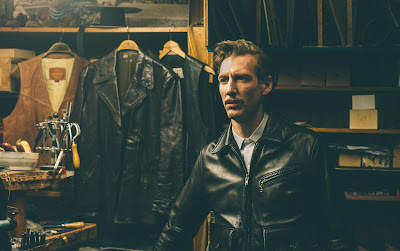Having pretty much come into early adulthood and gay/bisexual culture with the "artwork" of one,
Tom of Finland, as a prominent guidepost,
TrustMovies still, even now, knew nothing about the man who created the work. All that has changed with the theatrical opening of the movie that the country of Finland has submitted as a possibility for this year's Best Foreign Language Film -- something, I warrant, that Finland would never have done before or during the heyday of this artist's prominence. For much of his life, Tom, whose given name was actually Touko (according to the film, it became "Tom" due to his American publisher trying to make his work more marketable to the English-speaking crowd), would have been a near-pariah in his home country, had his work not been kept decidedly "under-cover."
Though part of Scandinavia, Finland was evidently not nearly as culturally, politically, socially or sexually forward-thinking as its Danish, Swedish and maybe Norwegian counterparts.
TOM OF FINLAND -- as directed by
Dome Karukoski (shown at left), with a screenplay by
Aleksi Bardy and additional dialog (I am guessing for the portions set in the USA) by
Mark Alton Brown -- turns out to be a surprisingly elegant, beautifully filmed combination of social, cultural, sexual and personal history that shows us the difficult times gays endured in Finland (and Germany) from the wartime 1940s through nearly the 1990s. By then gay culture had pretty much exploded throughout the western world -- with everything from its fashions to disco dancing to the idea of gay sex being not
quite so bizarre and horrendous as formerly imagined -- seeping rather quickly into the progressive mainstream view.
As personified by the excellent actor
Pekka Strang (shown above and below), Touko/Tom is brought to fine life as a young man, a middle-aged and increasing successful one, and finally the elderly gent who, having lost the love of his life even as his greatest successes occur, is left with memories. And his art.
To the film's credit, that "art" (a sample of which is shown below, and which I would call, as does
Wikipedia, "erotic illustration") is never pushed forward as anything great. Instead it is shown to have a huge appeal to the gay population -- which it did and still does. With its emphasis on uniforms, leather, big bodies, and very large muscles (including those cocks), it strikes directly at certain accouterments favored by a portion, probably rather large, of the gay population.
And the drawings are indeed beautifully done: In black-and-white, they're well-composed and about as in-your-face as you could wish. The movie itself, however, is a lot more subtle that the work itself. It must be, in order to give us the fairly in-depth look at Touko and his life: first, with his sister and eventually with the young man who moves into the pair's apartment as a renter and soon becomes Tom's lover, and finally a near-rapturous view -- so different from Finland -- of gay life in the USA during the burgeoning 1970s and then into the 80s, as AIDS begins to decimate the gay scene.
In America, we're introduced suddenly to some new characters -- Jack (
Jacob Oftebro, above, left, who also doubles, I believe, as Tom's gorgeous fantasy man, below) and Doug (
Seuman Sargent, above, right).
Why soon becomes clear, while the
how is handled with enough panache to grab our interest. One of the great strengths of Karuoski's direction (he also collaborated on the story) and Bardy's screenplay come via their refusal to hand us literally everything on a large and labeled platter. Instead they make us work, and the effort is invigorating.
Though their movie unveils in linear fashion, no dates are given anywhere in the film. Just figure it out. So we do. Neither are locations labeled. We're in Finland, then Germany, then America, then back to Finland. But thanks to an intelligent screenplay, the location is either quickly or eventually revealed.
Big events are handled with surprising restraint, as well. The death of a loved one comes and goes without the usual funeral scene, inclement weather and tears -- yet we feel it just as strongly. Notice a scene midway that deals, among others things, with yellow curtains and their meaning, then smile at how lovely is a later scene, featuring just a look at some fabric in a local shop.
The film is full of such moments, and it is all the richer and stronger for them. Oh,
Tom of Finland is feel-good, all right. But we've also been given enough feel-bad, along with intelligent probing of place, culture and mores, that the finale seems more than appropriate and justified.
Performances are all you could wish for, too. From the excellent leading actor, to the fine supporting roles. That's
Jessica Grabowsky, above and below, center, who plays Touko's sister, and
Lauri Tilkanen, below, left, in the role of Veli, the lover. If there is one big coincidence to be faced down, that would be the fact the Veli, who shows up to rent a room in the pair's apartment, is the same fellow with whom Touko has earlier had sex in the local park. I suspect this is an invention of the screenwriter, but either way, it doesn't derail the film. (I usually allow one major coincidence per movie.)
From
Kino Lorber, in Finnish and German with English subtitles and some dialog in English, and running 115 minutes, the movie opens Friday, October 13, in New York City at the
Quad Cinema and the following Friday, October 20, in Los Angeles (at the
Landmark NuArt), Berkeley (at the
Landmark Shattuck Cinema) and San Francisco (at the
Landmark Embarcadero Center Cinema). To see all currently scheduled playdates, cities and theaters, click
here and scroll down.






















































